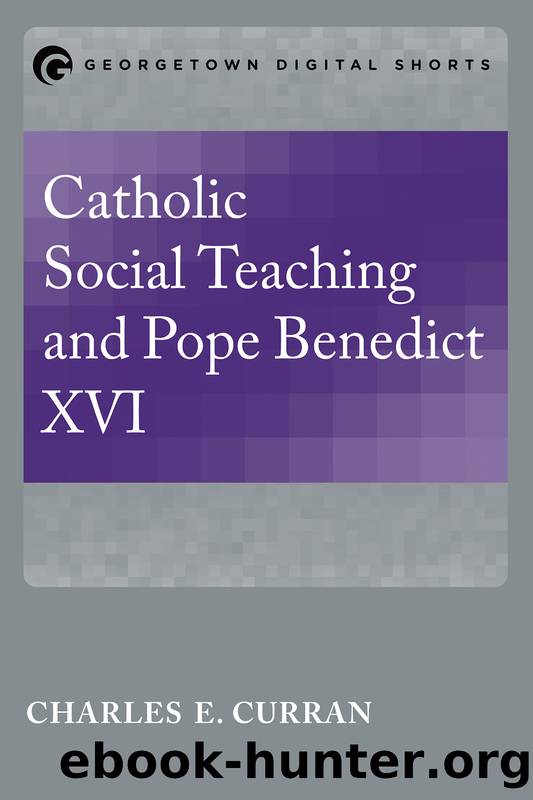Catholic Social Teaching and Pope Benedict XVI by Charles E. Curran

Author:Charles E. Curran
Language: eng
Format: epub
Publisher: Georgetown University Press
Published: 2014-10-15T00:00:00+00:00
Right and Duty to Teach
The primary explicit approach to ecclesiology and the understanding of the Church in the documents of Catholic social teaching concerns the right and the duty of the Church to speak out on issues facing human society. As mentioned earlier, the Catholic Church is not a sect but a church type, which by its very nature lives in the world and has a concern and interest in what occurs in the world. In his 1931 encyclical Quadragesimo anno, Pope Pius XI explicitly addresses the role of the Church and traces his teaching to Leo XIII. âBut before proceeding to discuss these problems, we lay down the principle long since clearly established by Leo XIII that it is our right and our duty to deal authoritatively with social and economic problemsâ (nos. 41â42, OâS, 52). The Church âcan never relinquish her God-given task of interposing her authority, not indeed in technical matters for which she has neither the competence nor the mission, but in all those that have a bearing on moral conduct.â Economic activity and morality are grounded in their own principles in their own spheres, but they are not so distinct that economic activity in no way depends on morality (nos. 41â42, OâS, 52). The sixth chapter of John Paul IIâs encyclical Centesimus annus, written on the one hundredth anniversary of Rerum novarum, raises the question of why the Church has developed its Catholic social teaching in the one hundred years since Rerum novarum. âHer sole purpose has been care and responsibility for the human person, who has been entrusted to her by Christ himselfâ¦. This, and this alone, is the principle which inspires the Churchâs social doctrineâ (no. 53, OâS, 513â14).
Benedictâs Caritas in veritate follows in the tradition and occasionally explicitly explains why the Church can and should develop such a social teaching. At the end of the introduction, Caritas in veritate deals explicitly with the role of the Church in proclaiming its social teaching. In this context, Benedict recalls the previous papal teaching that the Church does not have technical solutions to offer. âShe does, however, have a mission of truth to accomplish, in every time and circumstance, for a society that is attuned to the human person, to his dignity, to his vocationâ¦. Her social doctrine is a particular dimension of this proclamation: it is a service to the truth that sets us freeâ (no. 9, OâS, 530â31).
Caritas in veritate, like Populorum progressio, concerns itself primarily with integral human development. In the design of God, every person is called upon to develop and fulfill herself. âThis is what gives legitimacy to the Churchâs involvement in the whole question of developmentâ (no. 16, OâS, 534).
The two most significant particular issues in this encyclical are the economy and technology. Here again Benedict insists that these issues must be seen and guided on the basis of the meaning of the human, thus justifying why the Church needs to teach on these issues. âThe Churchâs social doctrine
Download
This site does not store any files on its server. We only index and link to content provided by other sites. Please contact the content providers to delete copyright contents if any and email us, we'll remove relevant links or contents immediately.
What Is the Gospel? (Foreword by D. A. Carson) by Greg Gilbert(989)
Jesus in Me by Anne Graham Lotz(937)
Daily Strength: Devotions for Bible Believing Study by Douglas Stauffer & Andrew Ray & Rick Quatro(894)
Christian Ethics by Wilkens Steve;(854)
The Practice Is the Path by Tias Little(816)
New Morning Mercies by Tripp Paul David(806)
Cleaning Up Your Mental Mess by Dr. Caroline Leaf(738)
Veritas: A Harvard Professor, a Con Man and the Gospel of Jesus's Wife by Ariel Sabar(721)
Greatest Mystery in the World by Og Mandino(661)
The Creative Call by Janice Elsheimer(596)
No More Christian Nice Guy by Paul Coughlin(581)
Our Appointment with Life by Thich Nhat Hanh(571)
Monastic Archaeology by Unknown(564)
2084 by John C. Lennox(556)
This One Wild and Precious Life by Sarah Wilson(542)
Jesus--Awesome Power, Awesome Love (Discover 4 Yourself® Inductive Bible Studies for Kids) by Kay Arthur(530)
The Duties of Parents by J.C. Ryle(513)
The Catholic Verses: 95 Bible Passages That Confound Protestants by Dave Armstrong(509)
The Tale of the Tardy Oxcart (Swindoll Leadership Library) by Swindoll Charles R(491)
